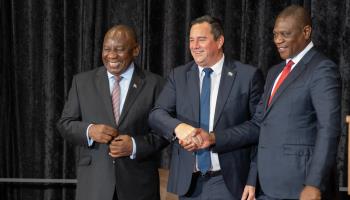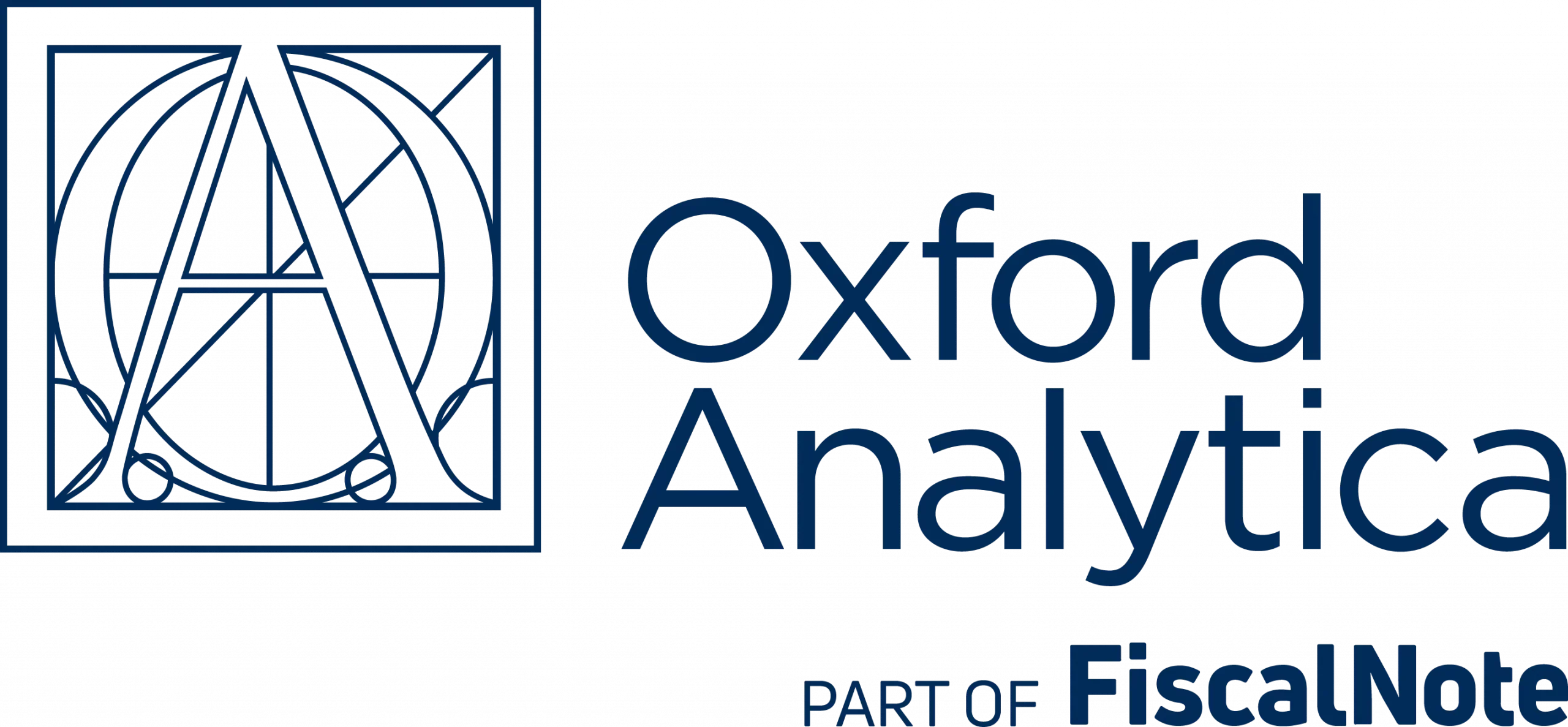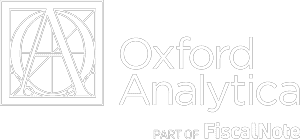After a landmark election, a new unity government faces the task of turning South Africa’s prospects around
South Africa’s prospects in 2025 will be shaped by the performance of the Government of National Unity (GNU) formed after the May 2024 elections. Already, the GNU has won increased market confidence, reflected in strengthened currency and reduced borrowing costs, as well as improved public support. The challenge will be to deliver tangible economic benefits before the 2026 municipal elections, when inter- and intra-party fissures will likely widen.
What next
Strategic summary
- A period of relative political stability is likely, underpinned by the weakness of the opposition.
- Economic progress may remain limited, despite incremental successes from microeconomic reforms and wider involvement of the private sector.
- Threats to the outlook include ANC factionalism, union militance over public sector wages and instability in the global environment.
Analysis
The GNU is founded primarily upon a partnership between two longstanding political rivals — the African National Congress (ANC) and the Democratic Alliance (DA) — that now find themselves the two main partners in government. Already, the differences between these parties have been evident — notably over the NHI scheme and the Basic Education Laws Amendment Bill (see SOUTH AFRICA: ANC dominance poses risks to GNU – July 4, 2024).
For now, tensions have been contained within GNU bargaining structures, which have redirected conflict into dialogue, kept some frictions behind closed doors and, crucially, postponed difficult political decisions. However, some kind of compromise will need to be reached before January’s State of the Nation address, when decisions will have to have been made ahead of February’s budget.
Another urgent requirement is an overall GNU development plan. For now, policy rests largely on vague technocratic pragmatism and a shared commitment to fiscal consolidation. This is effectively a continuation of President Cyril Ramaphosa’s ANC policies, which produced limited results. For the GNU to survive, something more inspirational and productive may be required.
Opposition weakness
The formal opposition’s weakness affords the government some breathing space.
The Economic Freedom Fighters (EFF) underachieved in May’s elections and its popular support has suffered further since then. Defections to the other main opposition party, former President Jacob Zuma’s uMkhonto weSizwe (MK) party — notably that of Floyd Shivambu, EFF leader Julius Malema’s closest collaborator and the party’s most substantial intellect — have left the EFF even more dependent on Malema, who looks, for now at least, a much-diminished figure (see SOUTH AFRICA: Opposition dynamics will evolve further – August 29, 2024).
The MK party, meanwhile, has lost some of the momentum afforded by its impressive electoral performance in May. It remains heavily dependent on the autocratic leadership of Zuma and the ethnic-based patriarchy that he represents. However, this cannot last forever: Zuma is currently 82 years old, will be 84 when the municipal elections take place and 87 at the next national polls.
It is difficult to envisage MK becoming a classical opposition party offering alternative policies and holding the government to account. It has virtually nothing to say about growth, employment or infrastructure, while several of its most prominent parliamentarians have been implicated in serious corruption allegations.
Widespread populist resentments, a powerful patriarchal personality and an appeal to ethnic politics will ensure that Zuma and the MK will remain a force for the immediate future. However, if it cannot align effectively with other anti-GNU forces it is difficult to see what it can achieve.
Collectively, the EFF (9.52%) and MK (14.58%) attracted less than 25% of the vote in May’s election. It therefore follows that a serious external threat to the GNU can only arise if the EFF and MK can, firstly, collaborate effectively together and, secondly, join forces with anti-GNU factions within the ANC. However, it is hard to envisage such a scenario, which would effectively require the EFF to accept MK’s extreme conservatism and Malema to subordinate himself to Zuma.
Internal tensions
There are two principal sources of internal opposition to ANC cooperation with the DA in the GNU:
- the ‘Alliance Left’ (the ANC-allied Congress of South African Trade Unions (COSATU) and South African Communist Party (SACP)); and
- provincial politics in Gauteng.
COSATU and the SACP are opposed to collaboration with the DA — although, as has been widely noted, this has not stopped prominent members of both from accepting ministerial positions in the GNU. Moreover, their opposition is ideological rather than practical, as it is unclear that either would prefer to work with the MK’s reactionary social conservatism.
Meanwhile, in Gauteng, populist provincial ANC leader Panyaza Lesufi has formed a minority provincial government, defying the national leadership’s instruction to work with the DA at all levels of government.
So far, the internal ANC differences this has engendered have been smoothed over and Lesufi’s removal — with the EFF’s connivance — of the DA’s Tshwane Mayor Cilliers Brink has gone unsanctioned. This too defies the national ANC’s embrace of the GNU’s spirit of cooperation and its own critical review (from 2023) of Lesufi’s policy of cooperation with the “proto-fascist” EFF in Gauteng.
It is not easy to discern Lesufi’s motivation. Visceral dislike of the DA and personal ambition are possibilities. There has also been speculation that the DA in government would impose scrutiny of contracts to address endemic corruption in Gauteng.
Whatever the motivation, Lesufi’s waywardness underscores the weakness of the ANC’s national leadership and the potential for instability where the EFF and MK — both ANC splinter parties — provide alternative poles of attraction. The 2026 municipal elections will provide pointers to whether Lesufi’s positioning will prove electorally popular.
Economic outlook
The unemployment rate has continued rising for the last three quarters, reaching 33.5% in the second quarter of 2024 — the extended rate (including ‘discouraged work seekers’) was 42.6%. High structural unemployment and low growth are recognised by the GNU as its principal challenges.
In the October 30 Medium-Term Budget Policy Statement (MTBPS), the GNU renewed the previous government’s commitment to curbing the budget deficit and debt while working to expand private-sector engagement in key sectors, especially energy and logistics. In this context, it hopes positive sentiment towards the GNU may translate into improved private-sector infrastructure investments.
Nevertheless, growth projections remain low. In the MTBPS, the Treasury revised its February growth forecast for 2024 downwards from 1.3% to 1.1%. Its base-case projection for the next three years is an average of 1.8%.
Given that a 3% growth rate is widely regarded as necessary to keep pace with the 500,000 annual entrants to the labour market, unemployment will likely keep rising until 2026 at least. The Treasury’s upside scenario is that resolution of the country’s logistics problems alongside additional capacity from new energy investments could raise the growth rate to 2.8% in 2025 and 3.6% by 2027.
Nevertheless, this represents a relatively optimistic outlook. For example, the concessioning of the country’s largest container terminal in Durban to the private sector has faced unexpected delays due to legal disputes (see SOUTH AFRICA: Court ruling adds to Transnet’s woes – October 10, 2024).
This constitutes a considerable setback, which underscores that, even with a relatively benign domestic political environment, economic progress will remain hostage to contingency, including possible global instability.

DA leader John Steenhuisen shakes hands with Deputy President Paul Mashatile and President Cyril Ramaphosa as the new GNU is sworn in (Rodger Bosch/Getty Images)
Authored by:

Dr Matt Ward
Africa

